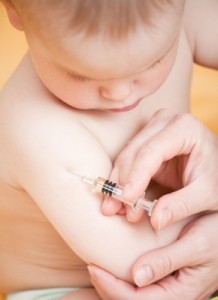In New Zealand, most children are fully immunised by the time they are five. This means it is very unusual to see children with illnesses like measles, polio, or tetanus.
But you don’t have to look back very far in history to find a time when it was a different story. In our grandparents’ time, before universal immunisation, it was common to have children in hospital with diseases that caused terrible suffering, permanent disability and sometimes death.
Immunisation Week, from 22- 28 April, is a reminder of how important it is to immunise our children – on time, every time – so that we never go back to those pre-immunisation days. And remember, all childhood immunisations are free.
While some diseases – like polio, rubella and diphtheria – have been virtually eliminated from New Zealand, we still see others, like whooping cough, pneumococcal disease and occasionally measles, so it is important to continue immunising against them.
In New Zealand, children can be immunised for free against the following diseases:
- hepatitis B
- diphtheria
- tetanus
- whooping cough
- Haemophilus influenzae type b (Hib)
- polio
- measles
- mumps
- rubella
- pneumococcal disease
- human papillomavirus (HPV) – girls only.
The injections are given by your doctor or nurse.
Immunisation uses the body’s natural defence mechanism, the immune response, to build memory to specific infections. If your child has been immunised and then comes into contact with that disease, their immune system will have a memory and then respond more rapidly to help prevent them developing the disease.
Immunisations are timed to offer the best protection for different diseases at the most vulnerable times and when the child’s immune system works the best. If your child is not immunised at the right time, they may not be fully protected.
In New Zealand, children are immunised at six weeks, then again at three months, five months, fifteen months and four years. For example, whooping cough is most severe for young infants and we know that delaying starting the infant vaccinations gives them a four-to-six times higher risk of being hospitalised with this illness.
Immunising infants on time will also offer protection to your child when they are at highest risk from pneumococcal disease. Pneumococcal disease can lead to some very serious illnesses, particularly pneumonia and meningitis. It can also cause ear infections that may lead to permanent hearing loss.
By having your children immunised on time, every time, you’re not only giving them the best protection possible from serious illness, you’re also protecting others in your community and around New Zealand by helping reduce the risk of infectious diseases spreading. The more children that are immunised, the harder it is for infectious diseases to spread. We can eliminate measles from our whole community if enough of our children are immunised.
You can help protect your child from diseases like whooping cough, measles and pneumococcal disease by getting them immunised on time, every time. For more information, call 0800 IMMUNE or visit immune.org.nz. Let’s make these diseases history!





